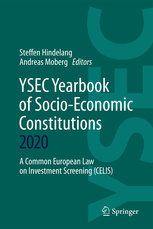Call for submissions – Yearbook of Socio-Economic Constitutions (YSEC)
We are pleased to announce a call for submissions for the second volume of YSEC (2021): Triangulating Freedom of Speech. The theme for this volume is the challenges associated with upholding freedom of speech where it conflicts with social rights, such as respect for private and family life, and with economic rights such as the freedom to conduct a business or the rights of free movement.
We live in a digital age, where technology shifts happen faster than most people even realize. In this age, we have all become powerful: media powerful. We used to sit in silence in front of newspapers and TV screens and the world was explained to us by the few “who always knew what was right and wrong”. Today, thanks to the Internet, social media, and Web 2.0, we can not only share our own thoughts with everyone in a more self-determined way, but we can also take part in public debate and even co-organise it ourselves. But, have we stopped to consider who sets the rules in this brave new world?
The empowerment of the individual challenges the “grand speakers” who are suddenly detecting “fake news”, echo chambers, and filter bubbles everywhere on the Internet. Internet-based communication allegedly hinders us from the “one truth”; as if newspaper hoaxes, propaganda, and narrow-mindedness were an invention of the Internet. The current heated debate about “fake news”, copyright and “upload filters” shows that we are unsure of how to deal with the newer and more complex phenomena of Internet-based speech. In no small part is this due to the fact that an important benchmark – our constitutional compass – is still strongly rooted in the past. Constitutions change at a significantly lower speed than technology. Societal changes pull constitutional changes; but what about normative content control?
Already there are demands for “old-times clarity”: truth filters on social media platforms, horrendous sums of liability for platforms that encourage (over-)thorough cleaning up, and, if some had their way, ideally an “Internet truth advisory board”. However, it is equally true that private individuals “regulate”: they decide what is found on the Internet and who may post on a platform. Who will protect us from the threatening care curate?
The YSEC invites scholars to address in original contributions the socio-economic constitutional mechanisms we need to conceive of in order to take the utmost advantage of today’s technological developments.
The YSEC also welcomes contributions to Part II of the Yearbook, which is focused on current developments in the broader field of the Yearbook’s thematic coverage.
Deadline for proposals: 1st December 2020.
Submission of proposals: Proposals of no more than 500 words should be uploaded to the YSEC Submissions Platform. Successful applicants will be notified in December 2020. The deadline to submit the final paper is 30th April, 2021. The manuscripts will be subjected to double-blind peer review, and authors will receive the comments from the editors and reviewers in early July 2021. The deadline for final submission of the contribution is 30th August 2021. Authors will use the template provided by the YSEC, and follow the YSEC’s style guide, both of which will be provided upon successful application.
The full Call can be downloaded here.
